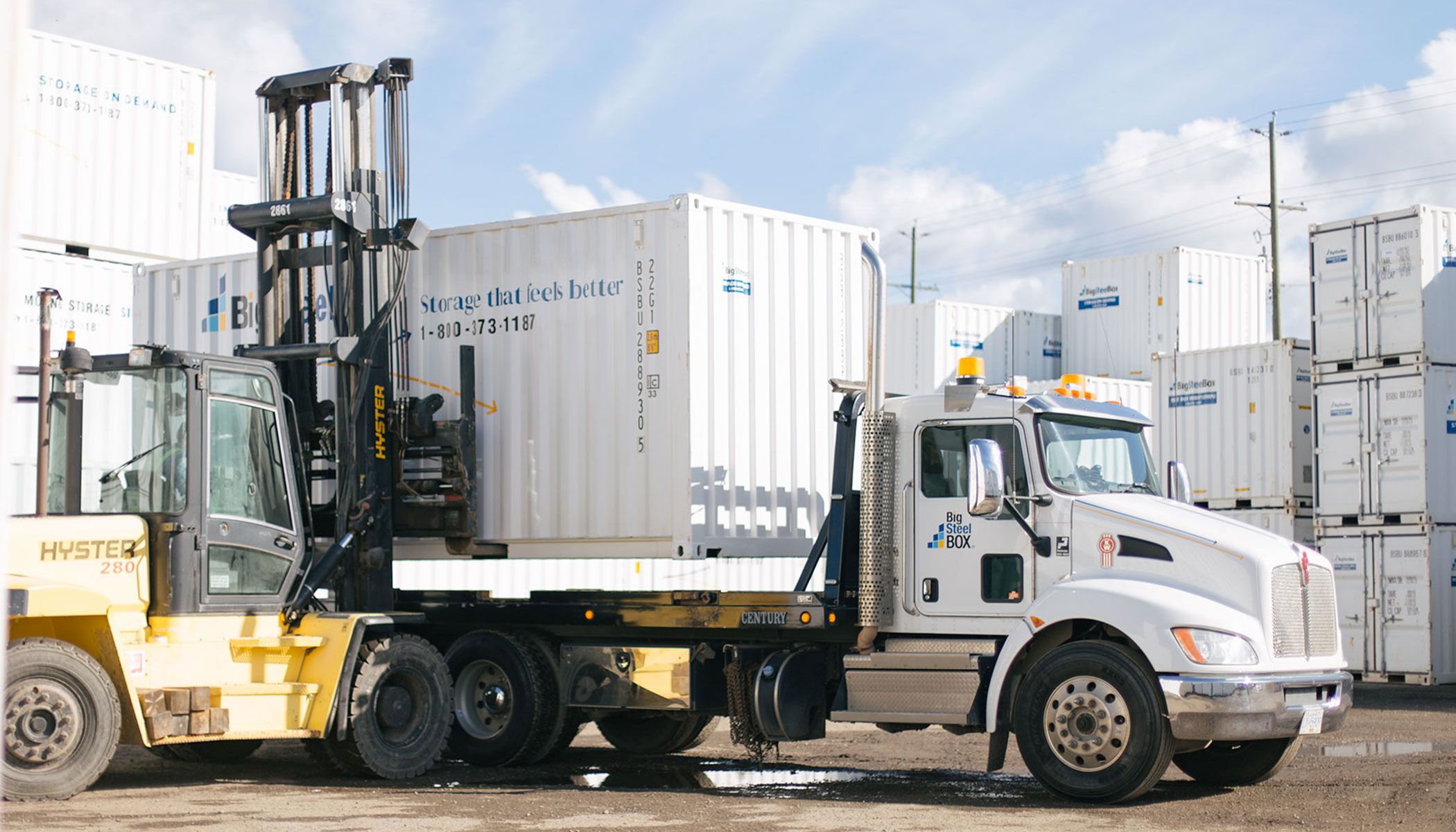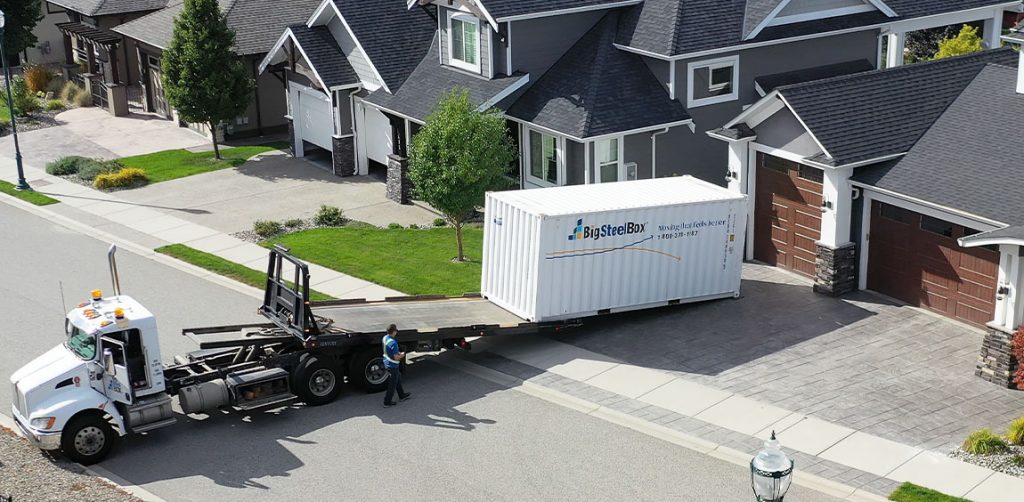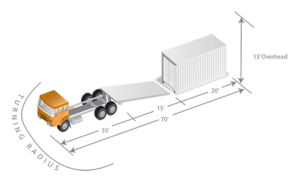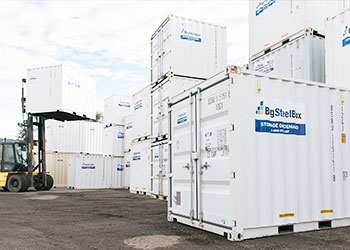
Safety when stacking shipping containers
Shipping Container Storage Safety
 The safety of our customers and staff is our top priority, so we believe it’s important for everyone to understand how to safely use shipping containers for storage.
The safety of our customers and staff is our top priority, so we believe it’s important for everyone to understand how to safely use shipping containers for storage.
The team at BigSteelBox is a family. We truly care for one another and our customers. We recognize that our customers are real people with families and busy lives, so it’s our passion to deliver an exceptional and safe moving or storage experience to each of them.
We work hard to ensure the operation of our storage yards meet the highest safety standards, which includes the safe operation of our trucks in our yard, during transport and at our customers’ locations.
Shipping containers are built for ocean transport, so they are very strong and secure. That’s what makes them so great for storage! But, their size and weight, and the fact that they are nearly air-tight, does mean that there are some necessary precautions when working with containers.
Here are a some of the most important safety factors to note if you plan to rent or buy a shipping container:
How to Safely Deliver a BigSteelBox
It’s very important for our trucks to have enough space to safely deliver a BigSteelBox.

The most common size container we rent and sell is a 20’ BigSteelBox, which requires at least 70-feet of space in a straight line and 10’ of width to be safely delivered.
This can be a challenge in some residential areas, so it’s important to work with your BigSteelBox Storage Consultant to make a plan for the delivery of your container.
It’s also important to make sure there are no overhead obstructions, like overhead wires, that could affect the delivery. The height of a BigSteelBox when loaded on a truck bed, is 12’ 6” feet so we require 15′ of overhead height to deliver a 20′ BigSteelBox, and we ask customers to make sure the area above where you want the box placed is free and clear of anything that could pose a risk.
Ideally, the spot where we deliver a BigSteelBox should be relatively flat, however, we understand this is not always possible. Our Placement Technicians can make adjustments for slopes of roads and driveways by setting wooden blocks under the corner posts of the container, but if your property is on a steep hill, it may be very difficult and even unsafe for us to deliver a Box.
If you have concerns about the slope of the location where you need a BigSteelBox, it’s helpful for our Storage Consultants to review photos of the area prior to delivery to see if it may be a safety hazard.
Check out this post about How we Deliver and Pick Up a BigSteelBox, to learn more about our delivery and loading process and watch a video demo.
How to Safely Stack Shipping Containers
 You’ve probably seen photos or video of container ships carrying hundreds or even thousands of shipping containers often stacked 5, 6, or even 7 containers high (and if you haven’t, google it now – it’s a pretty cool sight!). However, stacking containers requires special equipment and you’ll likely also need to obtain a permit from your local municipality or regional district.
You’ve probably seen photos or video of container ships carrying hundreds or even thousands of shipping containers often stacked 5, 6, or even 7 containers high (and if you haven’t, google it now – it’s a pretty cool sight!). However, stacking containers requires special equipment and you’ll likely also need to obtain a permit from your local municipality or regional district.
Stacking of shipping containers is usually only permitted in certain locations, like on construction sites or in industrial areas. Most cities will have some guidelines, and may require stacked containers to be properly connected to one another using locking devices.
You may also have to add additional weight to the bottom container to ensure it can support the stacked Boxes. Other factors to take into consideration include the wind rating in the area, and the load bearing capacity of the ground on which the Boxes are stacked.
If you’ve gone through the required steps and have received approvals to stack shipping containers on your site, you will most likely be required to use connecting devices used in the shipping industry. These will need to be specified (type, load bearing etc.) in the permitting process. There are many types, such as stacking cones, twist locks, and Quick Ties that are designed and engineered to connect containers together. Most of our BigSteelBox Stores have connecting devices in stock that are available for sale, or we can connect you to one of our suppliers to source your own equipment.
Safety Considerations for Storing Fuel, Chemicals & Flammable Materials in a Shipping Container
Shipping containers are ideal for the moving and storage of many types of items because they seal almost completely, which makes them weather and rodent-proof. And, while BigSteelBoxes come equipped with four small vents (two on each side) near the top to promote airflow and prevent issues with mold or mildew, it is not enough ventilation to safely store flammable materials, such as gas, solvents, and other chemicals.
Some flammable materials stored in shipping containers may release vapours that can accumulate in the container, which without proper ventilation, can pose a risk of fire and explosion if exposed to a heat source or flame. It’s for this reason that we advise customers who plan to use a BigSteelBox to store equipment that runs on gasoline, such as chain saws, lawn mowers or bobcats, to ensure gas tanks are empty before sealing them inside their container. Because containers are nearly air-tight, even small amounts of gasoline from fuel tanks can be a safety risk if they are exposed to high heat or flames.
If you plan to store flammable or hazardous materials, or would like to add additional features to a purchased BigSteelBox such as vents, exhaust fans, electrical or insulation, we offer shipping container modifications. For more information on the proper storage of explosive or flammable materials in shipping containers, visit the Worksafe BC website or call to speak with one of our Storage Consultants today at 1-800-373-1187.



